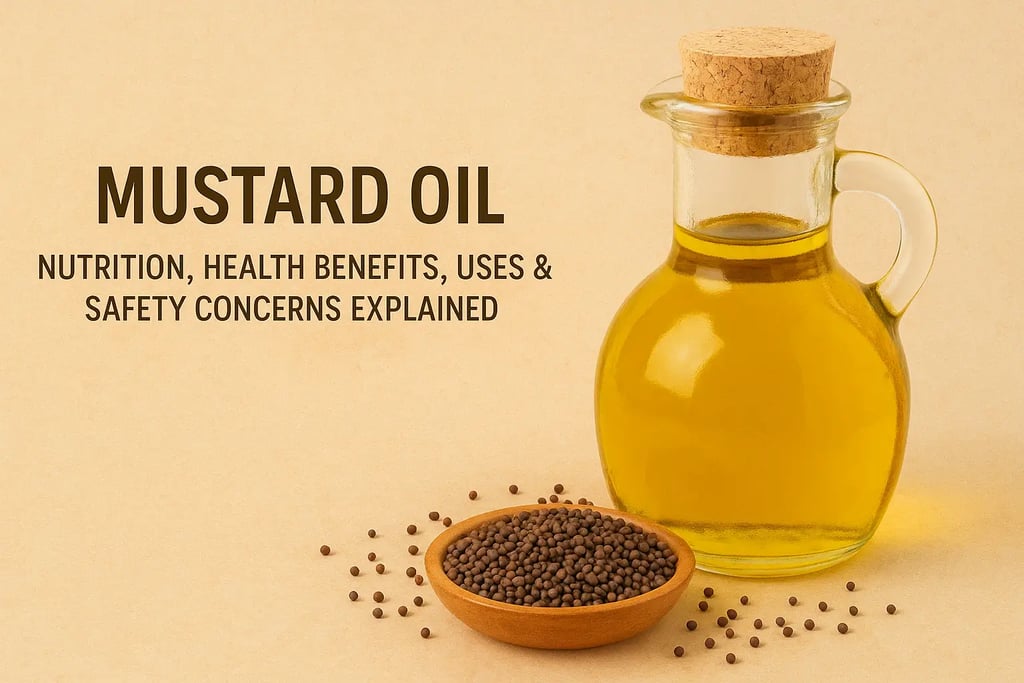Mustard Oil: Nutrition, Health Benefits, Uses & Safety Concerns Explained
Discover the nutritional profile, top health benefits, traditional uses, and controversies surrounding mustard oil. Learn how mustard oil supports heart health, skin, digestion, and more.


Mustard Oil: Benefits, Nutrition, Uses & Controversies Explained
Introduction to Mustard Oil and Its Nutritional Profile
Mustard oil, extracted from the seeds of the mustard plant, is a traditional cooking oil widely used in India, Bangladesh, Pakistan, and parts of Southeast Asia. Known for its strong aroma and pungent flavor, this oil has been valued for centuries in both culinary and medicinal practices. Mustard oil comes in two primary forms:
Cold-pressed mustard oil (kacchi ghani)
Essential mustard oil, produced through steam distillation
Both varieties offer unique health benefits, largely due to their rich nutritional composition.
Nutritional Value of Mustard Oil
Mustard oil contains a powerful combination of essential vitamins, minerals, and healthy fats. Key nutrients include:
Vitamin E – a skin-supporting antioxidant that boosts immunity and protects cells from oxidative damage.
Omega-3 and Omega-6 fatty acids – essential fats that support heart health, brain function, and inflammation control.
Selenium – vital for thyroid health and antioxidant defense.
Magnesium – supports muscles, nerves, bone strength, and heart rhythm.
This unique blend of nutrients makes mustard oil a beneficial addition to a balanced diet and skincare routine.
Health Benefits of Mustard Oil
1. Supports Heart Health
Mustard oil is rich in monounsaturated and polyunsaturated fats (MUFA and PUFA), which help regulate cholesterol levels.
Reduces LDL (bad cholesterol)
Increases HDL (good cholesterol)
This lowers the risk of plaque buildup and supports better cardiovascular health.
2. Powerful Antioxidant Properties
The presence of Vitamin E and selenium makes mustard oil a potent antioxidant. These nutrients help neutralize free radicals, reducing the risk of chronic diseases such as:
Heart disease
Certain types of cancer
Degenerative conditions related to inflammation and oxidative stress
3. Anti-Inflammatory Benefits
Mustard oil is known for its natural anti-inflammatory properties. Regular use may help relieve:
Joint pain
Muscle soreness
Symptoms of arthritis
Its warming effect also makes it popular in traditional massage therapies.
4. Promotes Better Skin Health
Mustard oil is widely used in skincare due to its hydrating, antibacterial, and antifungal qualities.
Acts as a natural moisturizer
Helps combat acne-causing bacteria
Strengthens the skin’s protective barrier
Its fatty acid content also supports softer, healthier, and nourished skin.
5. Boosts Hair Growth
Rich in omega fatty acids, antioxidants, and minerals, mustard oil promotes strong and healthy hair.
Improves blood circulation to the scalp
Strengthens hair roots
Helps reduce dandruff due to its antimicrobial properties
This makes it a popular ingredient in traditional hair care routines.
6. Supports Digestive Health
Mustard oil stimulates the secretion of digestive juices and enzymes, aiding:
Better digestion
Improved metabolism
Enhanced nutrient absorption
7. Natural Antibacterial and Antifungal Properties
Its antimicrobial effects help prevent common infections, making it useful both in cooking and in topical applications.
Controversies and Reasons Behind Mustard Oil Bans
Despite its long history of use, mustard oil has been the subject of regulatory scrutiny, especially in Western countries.
Why Some Countries Restrict Mustard Oil
The primary concern lies in its erucic acid content—a monounsaturated fatty acid present in high amounts in mustard oil.
Research suggests that very high levels of erucic acid may contribute to:
Myocardial lipidosis, a condition involving fat buildup in heart tissues.
Due to these concerns:
The U.S. FDA does not approve mustard oil as an edible oil.
Canada and some European countries impose strict limits on erucic acid in foods.
Traditional Consumption vs. Modern Regulations
In contrast, millions of people in South Asia consume mustard oil daily without reported widespread health problems. Supporters argue that:
Traditional diets rely on moderate consumption, which is considered safe.
Long-term cultural use shows few adverse effects when consumed responsibly.
Current Scientific Perspective
Ongoing research is trying to understand the real-world impact of erucic acid. Some studies suggest the risks may be overstated at typical dietary levels, while others call for more comprehensive data.
Nutrition experts generally advise:
Moderation
Choosing high-quality, cold-pressed oils
Balancing mustard oil with other healthy fats
Conclusion
Mustard oil is a nutrient-rich, flavorful, and versatile oil with a long list of health benefits—from improved heart health and digestion to better skin and hair. However, its erucic acid content has led to regulatory concerns in several countries.
By understanding both its benefits and controversies, consumers can make informed decisions about adding mustard oil to their diet and daily wellness routine.
